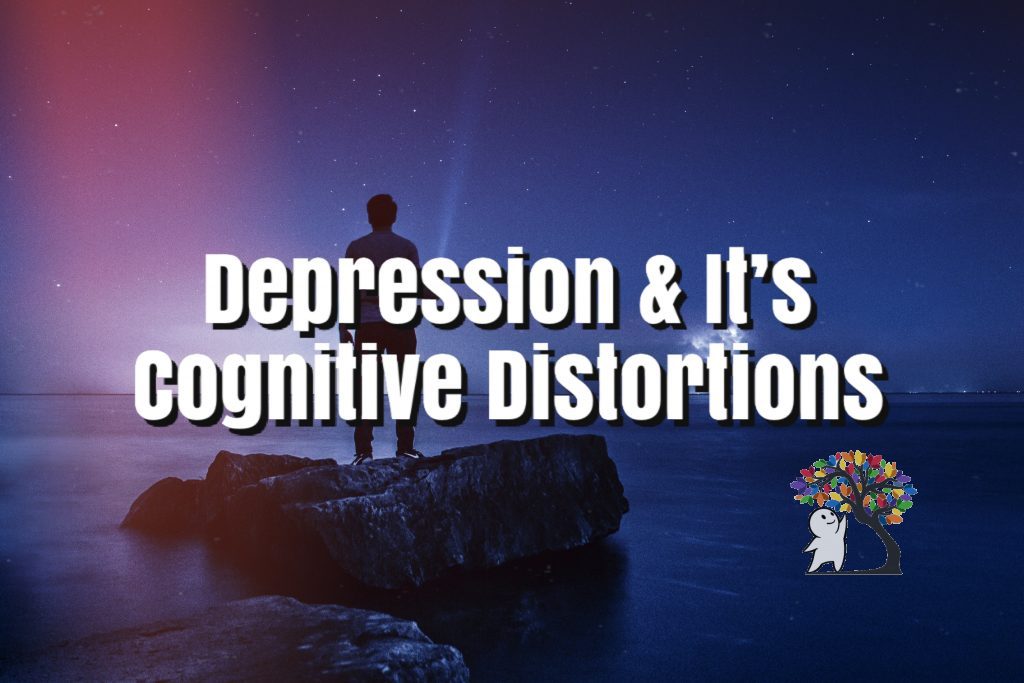Cognitive Distortions & How to Challenge It

Battling my whole life with depression. Left me with a terrible habit. My mind became addicted to negative thinking. It got so bad that I unintentionally looked for false evidence to confirm my distortions. My mind could not differentiate reality from my own lies. This is called cognitive distortion. Basically, it is a concept from Cognitive Behavioral Therapy where the mind is biased when thinking.

You might be asking yourself, “how does this happen”? Well, our brain is designed to protect us. It warns us from potential danger. Overtime we start to question our reality, creating distorted connections in our brain. Our mind is designed to connect ideas and patterns. The problem occurs when we connect information that is faulty or untrue.
There are numerous types of cognitive distortions, but in this article, I will write about the ones I experienced with depression:
- Overgeneralization: This distortion occurs when an individual creates a general assumption after a single or series of events. Feeling alone in this world. I looked for love from my past crushes growing up. Whenever I’d plucked up the courage to tell them how I felt, they would distance themselves. Ruining the friendship. After experiencing this I automatically assumed that I was useless, ugly, and unattractive.
-

Photo by: Banter Snaps Jumping to Conclusions: My whole life I yearned for acceptance and genuine connection with others. My need to be accepted spiraled out of control. I ended up jumping to harsh conclusions. This type of cognitive distortion has two sub-types. The first being ‘mind reading’, which is guessing what the other person is thinking. While the second type is ‘fortune telling’. This distortion is when you predict what will happen.
Unfortunately, I did both. For example, if someone did not answer my phone call. I would think they hated me and that they were actively ignoring me. For instance, during ‘fortune telling’, I would tell myself, “why invite your friends to hangout, they are going to deny your invitation”.
- Magnification: In this type of cognitive distortion the person will exaggerate and/or minimize the meaning of things. I usually ended up minimizing myself. For example, whenever I got a good grade. I would believe that I simply got lucky. Instead of acknowledging that I’m an intelligent person.
-

Photo by: Tim Bogdanov Disqualifying the positive: When this happens. The person ignores or invalidates good things. I always felt ugly and fat. Being insecure, I idealized the American beauty. Since I’m a Latina, I did not represent what most boys in my school considered attractive. I internalized all the comments they said. Eventually, whenever someone would complimented me. I wouldn’t believe them. I thought they were lying.
- Emotional reasoning: Here the individual accepts their emotions as a fact. In other words, the person ends up thinking. “I feel it, therefore it must be true”. I did this every day. Each morning I would wake up feeling pessimistic. Due to this I believed my whole day will be pathetic.
- Personalization and blame: This cognitive distortion involves putting the entire blame onto someone else or yourself. In my case my biological father was abusive and rejected me. I ended up blaming myself for the abuse. I thought I wasn’t good enough for him.
-

Photo by: Devin Justesen Should statements: When this occurs, the person creates statements of what he or she ‘should’ or ‘must’ be doing. Having low self-esteem destroyed my confidence. I ended up thinking: I should be smarter, I must be skinnier, I should be richer, and I should be loved more, etc.
Now, lets get to the best part. Through therapy and much analysis. I was able to challenge my cognitive distortions. In order to do this, you must question your reality. This can be scary and unsettling. Especially, when you start to realize your faulty thinking patterns. Here are examples of questions I asked myself:
- How do I know this thought to be true?
- What evidence do I have to support this belief?
- Am I assuming I can’t do anything to change my situation?
- Am I overgeneralizing?
- Is this thought or belief helpful?
-

Photo by: Haziq Tumaran Am I assuming the worst thing possible?
- Am I blaming myself for something which is not my fault?
- Am I making this situation personal?
- Am I comparing this situation to previous ones?
- Are these standards I hold myself to be reasonable?
- Is this situation truly under my control?
- Am I bringing myself down over an event?
- What are other ways to view this situation?
- Am I focusing on the negative side of things?
- Do I have a trustful friend or adult I can consult these thoughts with?
- Am I confusing thought with fact?
- What is the effect of thinking the way I do?
- Am I predicting the future?

This list of questions helped me tremendously to change my way of thinking. I will not lie, at first, I became upset when I realized the damage I did to myself by thinking negatively. It was shocking to realize that although I experienced years of unfair abuse. It was up to me to react differently. I recognized that I can’t control others, but I sure can control my reaction to my circumstances.
Keep in mind this list of questions does not replace therapy or professional help. It is okay to ask for help. Asking yourself these questions can be overwhelming at times, and having a therapist can be of immense help. There will be moments when your questioning can give rise to more questions. That’s perfectly fine. It is part of the process. If you become confused take a step back and allow others to help you.
Have you experienced these cognitive distortions as well? What has been the effect? Let me know in the comment section below.
Related: 9 Unhealthy Behaviors Adults Have After Going Through Childhood Trauma
Checkout Psych2Go’s Video on 7 Signs You’re Becoming Toxic



It’s a great article, that can shed some light on the failure I’m living at present.